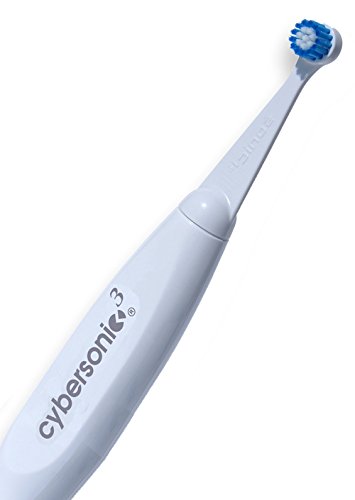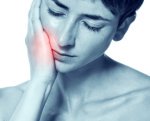What Causes
Lower Jaw Pain
What causes lower jaw pain? This can be very confusing and worrying. There are a LOT of different structures and tissues around the lower jaw, so there's a lot that can go wrong. And because the area around the lower jaw is SO complicated, it can be hard to work out what's happening! Let me help you.
When you have a lower jaw pain, the first thing to look at is exactly WHERE the pain is coming from.
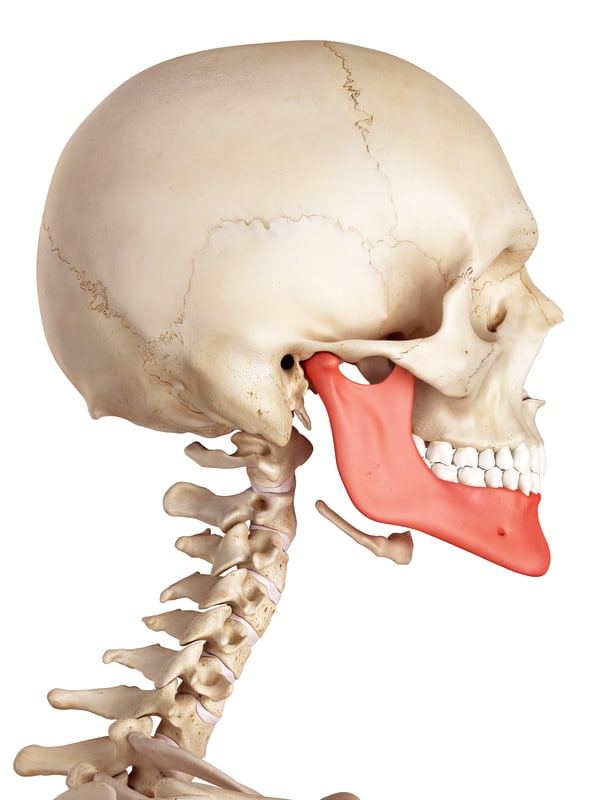 The lower jaw in red, on a model
The lower jaw in red, on a modelWhat Causes Lower Jaw Pain?
If you can narrow down the source of the pain, then you can make some educated guesses at what's going on. Here are some things to look for;
The pain is coming from the front half of your lower jaw: around your chin, for example. The most common cause will be something to do with a tooth. You will either have
- an inflamed nerve in a tooth (pulpitis),
- a dental abscess,
- or a tooth extraction infection.
If you have pulpitis in a tooth, you will need to see a dentist for treatment. A tooth with an inflamed nerve like this will need root canal treatment or extraction.
For a tooth with an abscess, or if you have a tooth extraction infection, you will need antibiotics.
If you do not have any lower teeth, and wear a full lower denture, then it is also possible that your lower jaw pain is coming from the lower denture pressing on the Mental nerve, which comes out of your lower jaw around your chin, and gives sensation to the front third of the lower jaw and chin area. You can read more about this at my page on Denture Pain.
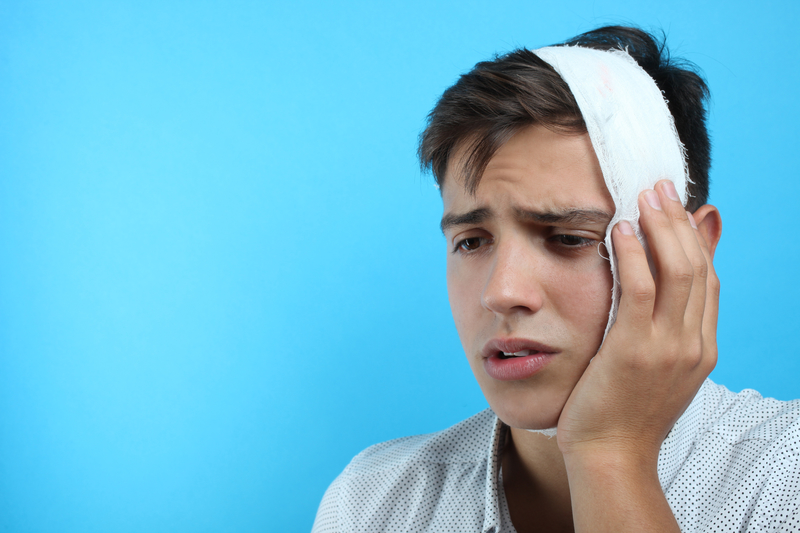 What causes lower jaw pain?
What causes lower jaw pain?If your lower jaw pain is coming from the rear half of your jaw, then you need to try to work out if the pain is coming from higher up, near your jaw joint or ear, OR whether it's coming from lower down, below your ear.
If it's higher up, and there is NO SWELLING, then there's a good chance that you have Jaw Joint Pain.
If you are also getting headaches, also take a look at my page on Migraine Remedy.
- BUT if your pain is coming from lower down, under your ear, then there are more possibilities;
You may well have a wisdom tooth buried under the gum, pressing against the other teeth and the bone around it. If you can feel or see some part of the wisdom tooth poking through the gum, then you may have a pericoronitis. This is a fancy dental word for a gum inflammation around a tooth that is just coming through the gum. Also take a look at Symptoms of wisdom teeth.
What Causes Lower Jaw Pain?
- If you have had a dental implant put into your jaw recently, you might have a Dental implant infection. This can be quite uncomfortable, and potentially serious, leading to the implant falling out. You should also look at Dental implant complications.
- If the pain is on the side of your lower jaw, and you have a slight swelling that is bone-hard, this might be worrying. We all worry that a vague pain or swelling without any obvious cause might be cancer. You can find out more about this by going to my page on cancer of the lower jaw, and reading some more detailed information about what to look for and what you should do.
- If you have a small swelling under your lower jaw, you should look at Swollen gland under jaw for more information about the possible causes.
 lower jaw pain
lower jaw painWhat Causes Lower Jaw Pain
WHAT OTHER causes are there of lower jaw pain?
The main ones are listed above, and can be summed up as either due to:
- infection (tooth abscess, or a bone infection after an extraction),
- irritation or inflammation (wisdom tooth coming through, TMJ / jaw joint pain),
- or possibly a tumor of some sort.
The remaining possibilities are a mixed bunch, and usually you'll know what's happening or what has happened recently to cause the pain!
Tooth pain after getting a crown. This can feel like a pain in the jaw, especially if the crown (or "cap") is a little too big. When this happens, the new crown is hitting the opposite tooth slightly before all the others.
This means that the tooth is getting "hit" more often and more heavily than normal, and the nerve inside the tooth becomes inflamed. Read more about this at my page Tooth Pain After Crown.
Remember to check out my top recommended electric toothbrush, which has the best performance and a great price at Amazon - the Cybersonic 3 brush.
Tooth Pain after filling a tooth. You can get a pain in your tooth or jaw after having a new filling in a tooth. Sometimes it's hard to tell whether the pain is coming from the jaw or from the tooth. The clue is that you've just had a filling done, so that's the most likely cause.
It can be down to the new filling being a little too big (or "high on the bite"), or it may be down to the sheer depth of the filling. If there was a lot of decay in the tooth, the dentist will have needed to drill deeper to get all the decay bacteria out of the tooth. This is traumatic for the nerve in the tooth, and it may be painful for a while afterwards, feeling like a lower jaw pain. There's more detail at Tooth Pain After Filling.
Denture pain. If you have a denture in your lower jaw, it can cause pain in 2 ways; First, if your lower jaw has shrunk down quite a bit, the denture may be pressing on a nerve that sits under the gum, about halfway along the jawbone.
Also, it's possible that your jaw has shrunk down or changed shape since the denture was constructed, resulting in the edge of the denture digging into the gum somewhere and causing pain. For both of these problems you need to see a dentist to get the denture adjusted. Read more at Denture Pain.
Root canal. If you've had a root canal treatment, there are a number of things that can cause pain in your jaw afterwards. The most common cause would be some residual infection in the jaw bone around the root of the affected tooth. This may settle down if your own immune system can deal with the infection, but most times your dentist will give you some antibiotics to speed things up.
The next most common reason for lower jaw pain after root canal is if something has been forced out of the tip of the tooth root during treatment. This may be a bit of disinfectant, such as weak sodium hypochlorite solution, or it may be some root filling material.
The pain in both these cases is caused by chemical irritation of the jaw bone right next to the tooth root. Although this will normally heal up by itself with time, most dentists will prescribe antibiotics to prevent a secondary infection of any dead bone resulting from the foreign material. Rarely, the lower jaw pain gets worse as time goes by, and an oral surgeon will need to do a small operation on your jaw to remove the foreign material and any dead bone in the area.
For more information about this, take a look at my page on Pain After Root Canal Treatment.
What Causes Lower Jaw Pain
Lyme Disease. This is an odd one. If you've been bitten by a tick carrying the Lyme bacteria, you are likely to develop Lyme Disease. This can cause odd and vague pain in the jaws - normally the UPPER jaw, but sometimes anywhere in the jaws!
This can be hard to pin down, as sometimes you don't realise that you have been bitten by a tick, and you may have no other (or few) symptoms of Lyme disease. Your doctor will usually make a diagnosis of Lyme based on your symptoms (especially if you found a tick on you in the weeks beforehand), and blood tests - although blood tests are not 100% accurate.
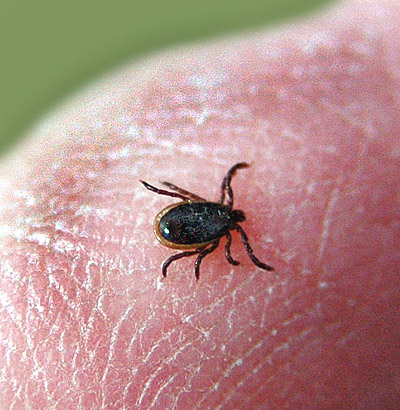 Tick responsible for Lyme
Tick responsible for LymeAs soon as Lyme disease is suspected, your doctor should give you high dose antibiotics to attack the bacteria responsible as quickly and as hard as possible. The sooner the Lyme disease bacteria is eliminated, the better.
The longer the disease goes on for, the higher the chance of long-term problems persisting, even after antibiotic treatment has killed the bacteria. It seems that the Lyme bacteria can cause permanent changes to the nervous system if it has a chance to stay in the human body for too long.
It can also cause heart problems, needing surgery. Read more at Symptoms of Lyme Disease.
Trauma. This can cause lower jaw pain in several ways:
FIRST, if you get a knock or a blow to your lower jaw, it's likely to react in the same way as if you hit your thumb with a hammer; it will swell up, go red and be painful! And it will probably bruise afterwards. The CAUSE of this pain will be obvious, and the simplest thing you can do is put a cold pack on the area, and take some anti inflammatory medicine such as ibuprofen.
SECOND, if the blow is severe enough (say in a car crash), you could get a broken jaw. But sometimes you don't realize, because it's a small fracture, or the two sides of the fracture haven't moved apart much.
The big clue here is when you try to bring your teeth together. If you DO have a broken jaw, there's a good chance that your top teeth and bottom teeth will not fit together properly. Of course, your jaw will be bruised and things will feel very odd, but if your jaw is NOT broken then you should be able to get your teeth to fit together when you bite gently.
What Causes Lower Jaw Pain
THIRD, if you have a severe jaw fracture that results in the ends of the fractured bone sticking through the skin (a puncture wound) then infection inside the bone is a real problem after you've had hospital treatment to re-set your jaw. The big worry is osteomyelitis.
The problem here is that bacteria from the skin surface can get deep inside the bone, due to the exposed bone at the time of fracture. I discuss this more at Jaw Bone Pain.
And you should also read my page at Jaw Bone Infection. This is a very important page. I recommend it strongly.
As always, my guide to what causes lower jaw pain cannot be exhaustive. I have included the main causes of pain in the lower jaw. OBVIOUSLY in most cases you need to get yourself along to a dentist, or in the case of a suspected jaw fracture to the nearest ER department.
As ever, the SOONER you get treatment, the quicker and simpler it will be. Delaying treatment will almost ALWAYS make things more difficult, more painful, and possibly result in a poorer long-term outcome. DON'T DELAY!
